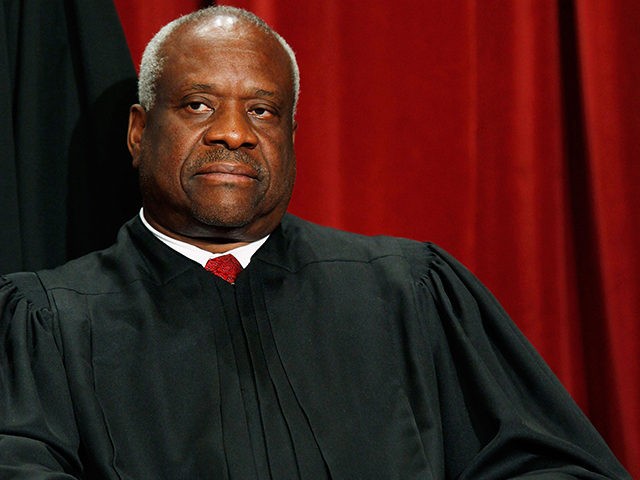In a Washington Times op-ed, Breitbart Legal Editor Ken Klukowski and Ken Blackwell of the Family Research Council write that Justice Clarence Thomas’ 25-year Supreme Court legacy “would make the Framers proud.”
This week marks 25 years since President George H.W. Bush named Clarence Thomas to the U.S. Supreme Court, inaugurating a tenure marked by unwavering commitment to principled originalism.
Justice Thomas‘ life is an only-in-America success story. As movingly recounted in his autobiography, “My Grandfather’s Son,” Clarence Thomas was born into extremely modest circumstances, then raised by his maternal grandparents when his mother became unable to provide for him and his brother. This man of humble origins eventually made his way to Yale Law School, quickly rose through the ranks of public service to become a federal appeals judge, and ultimately ascended to the nation’s highest court at age 44.
One of the authors (Ken Blackwell) has been privileged to call Clarence Thomas a friend for more than 30 years and shared a close adviser who mentored them both, former Brandeis University President Morris Abram. The other author (Ken Klukowski) is a constitutional lawyer and former law clerk to a highly respected federal appeals judge. Looking at Justice Thomas through both of these lenses, he must be called nothing short of a national treasure.
Justice Thomas‘ judicial opinions reflect who he is as a person: unpretentious, loving liberty, embracing the role that the Constitution assigns to the Supreme Court in our self-governing republic — and emphatically rejecting the temptation to expand the powers of the court by constitutionalizing his personal preferences. He eschews flowery language and witty turns of phrase in favor of a plain, direct, powerful exposition of what the law is.
His approach to interpreting the Constitution can be summed up in a single word: originalism. Justice Thomas believes that any legal text — whether the Constitution, a statute or some lesser authority such as a regulation — should be interpreted according to those words’ public meaning at the time the American people’s representatives adopted them. It is the ultimate respect that an unelected leader can show to the democratic process.
One of the most remarkable features of Justice Thomas‘ originalism is how low of a bar he sets for the doctrine of stare decisis where the Constitution is concerned. This general judicial policy — that precedent must be adhered to unless special circumstances require overruling it — can be perilous when the Supreme Court is interpreting the Constitution. If the court misinterprets a statute or regulation, elected leaders can supersede that decision by amending the law. But it is extremely difficult — deliberately and rightly so — to amend the Constitution.
Read the rest at the Washington Times.

COMMENTS
Please let us know if you're having issues with commenting.